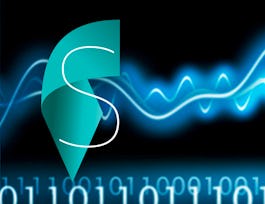Digital Signal Processing is the branch of engineering that, in the space of just a few decades, has enabled unprecedented levels of interpersonal communication and of on-demand entertainment. By reworking the principles of electronics, telecommunication and computer science into a unifying paradigm, DSP is a the heart of the digital revolution that brought us CDs, DVDs, MP3 players, mobile phones and countless other devices.


Digital Signal Processing 3: Analog vs Digital
This course is part of Digital Signal Processing Specialization
Taught in English
Some content may not be translated


Instructors: Paolo Prandoni
11,691 already enrolled
Included with 
Course
(71 reviews)
What you'll learn
The difference between continuous and discrete time
Sampling and interpolation
Quantization, A/D and D/A converters
Multirate signal processing
Details to know

Add to your LinkedIn profile
4 quizzes
Course
(71 reviews)
See how employees at top companies are mastering in-demand skills

Build your subject-matter expertise
- Learn new concepts from industry experts
- Gain a foundational understanding of a subject or tool
- Develop job-relevant skills with hands-on projects
- Earn a shareable career certificate


Earn a career certificate
Add this credential to your LinkedIn profile, resume, or CV
Share it on social media and in your performance review

There are 4 modules in this course
From continuous time to discrete time and vice versa.
What's included
10 videos9 readings1 quiz1 ungraded lab1 plugin
What happens when we sample continuous-time signals and problems we should anticipate.
What's included
5 videos4 readings1 quiz1 plugin
How to change the sampling rate entirely from the discrete-time domain.
What's included
3 videos3 readings1 quiz1 ungraded lab1 plugin
Going from analog to digital, and vice-versa.
What's included
8 videos6 readings1 quiz1 ungraded lab1 plugin
Instructors

Offered by
Recommended if you're interested in Electrical Engineering

École Polytechnique Fédérale de Lausanne

École Polytechnique Fédérale de Lausanne

École Polytechnique Fédérale de Lausanne

École Polytechnique Fédérale de Lausanne
Why people choose Coursera for their career




Learner reviews
Showing 3 of 71
71 reviews
- 5 stars
90.14%
- 4 stars
7.04%
- 3 stars
0%
- 2 stars
0%
- 1 star
2.81%

Open new doors with Coursera Plus
Unlimited access to 7,000+ world-class courses, hands-on projects, and job-ready certificate programs - all included in your subscription
Advance your career with an online degree
Earn a degree from world-class universities - 100% online
Join over 3,400 global companies that choose Coursera for Business
Upskill your employees to excel in the digital economy
Frequently asked questions
Access to lectures and assignments depends on your type of enrollment. If you take a course in audit mode, you will be able to see most course materials for free. To access graded assignments and to earn a Certificate, you will need to purchase the Certificate experience, during or after your audit. If you don't see the audit option:
The course may not offer an audit option. You can try a Free Trial instead, or apply for Financial Aid.
The course may offer 'Full Course, No Certificate' instead. This option lets you see all course materials, submit required assessments, and get a final grade. This also means that you will not be able to purchase a Certificate experience.
When you enroll in the course, you get access to all of the courses in the Specialization, and you earn a certificate when you complete the work. Your electronic Certificate will be added to your Accomplishments page - from there, you can print your Certificate or add it to your LinkedIn profile. If you only want to read and view the course content, you can audit the course for free.
If you subscribed, you get a 7-day free trial during which you can cancel at no penalty. After that, we don’t give refunds, but you can cancel your subscription at any time. See our full refund policy.

